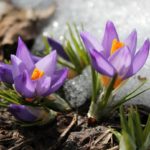Do you remember being in elementary school during the winter season? We wore coats that swallowed us whole and boots that clunked with every step. At night prayers would be lifted to have a snow day, a chance to play with our friends, drink hot chocolate and not even think about what assignments were going to be due soon. Most mornings, though, our little eyes would peek through the blinds and be met with disappointment: dried and dying grass without even a smidge of frost on the window.
Yet every once in a while, when a cold front swept in, we’d stare at the news on TV and burst into cheers when the name of our school ran along the bottom of the screen next to one bold word: CANCELLED.
The fresh blanket of snow would be trampled not even an hour later as sleds dragged out of the garage, snowballs rolled, and snow angels imprinted against the ground. Our noses would tinge red and our laughter filled the icy air. These snow days, truly a part of the United States’ school culture, were blessings that provided rejuvenation and rest. But now they’re never going to look the same.
Back in 2018, school districts like Anderson County in South Carolina replaced all snow days with “eLearning days.” This way no resources would be wasted and the academic calendar` would not stretch into the early days of summer. When COVID-19 hit last March, “eLearning days” became normal school days. Hours spent on a computer, listening to lecture after lecture with a serious lack of Vitamin D and simple movement to keep us from going insane.
Now, almost a year into the pandemic, online learning continues to thrive, even when ice covers the streets and sidewalks. Snow days don’t exist anymore, but they need to.
When I first received the Asbury alert that classes would be completely canceled on Feb. 15, I truly didn’t believe it. The snowstorms were rolling in but my friends and I remained suspicious. The whole night our conversations kept floating back to the text being a trick, that any second we’d get an email clarifying the mistake because we couldn’t comprehend having a day off.
Some Asburians might argue that we have had days off this semester. Eagle Days were implemented to give students time “to breathe and refresh from the Hyflex model,” as stated in the emails we received at the beginning of the semester. Sporadically throughout the 14-week schedule, we get random days with no class, supposed time to rejuvenate our souls. However, Eagle Days have just turned into study days. We might get an extra hour to sleep in, but many students (myself included) have no choice but to do homework and other assignments that are due the next morning. We don’t count them as days off, and they do not match the level of rest we receive through spring break. Even on our snow day, most of us read textbooks and took notes.
It makes me miss those elementary school snow days. I understand that education and sticking to a schedule is important, but so is mental health. We’ve been living, working and studying in a pandemic, and the weight of it is striking us now. It’s just not a good sign when students all over the country plead and pray for ice storms because they believe it may be the only time they’ll get to rest.







